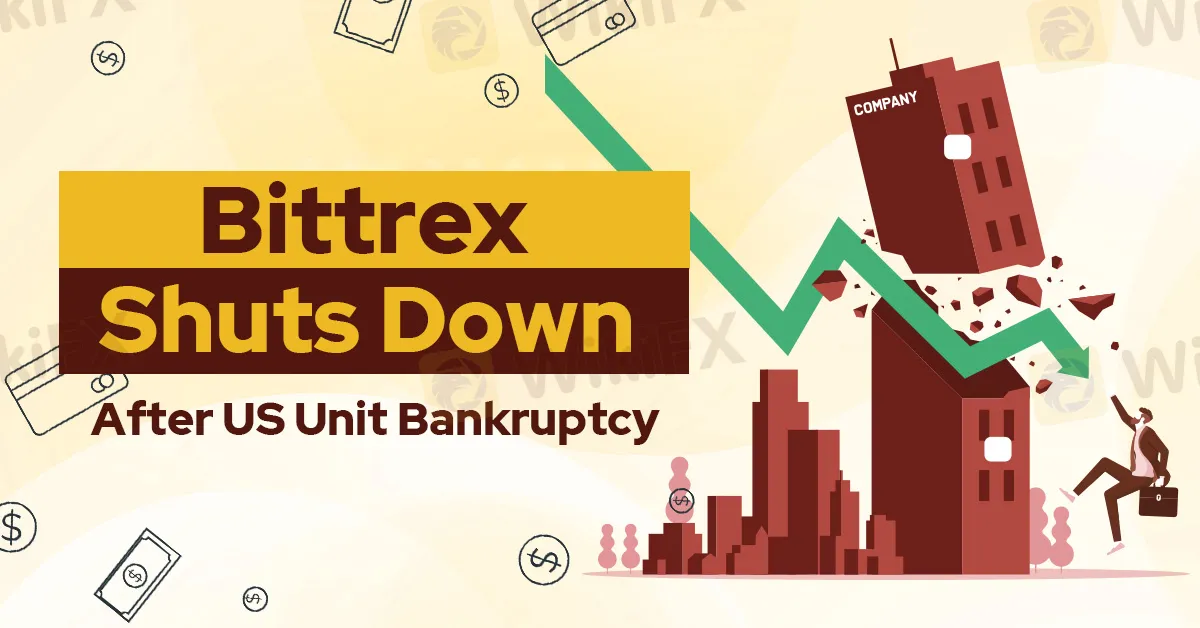简体中文
繁體中文
English
Pусский
日本語
ภาษาไทย
Tiếng Việt
Bahasa Indonesia
Español
हिन्दी
Filippiiniläinen
Français
Deutsch
Português
Türkçe
한국어
العربية
Bittrex Shuts Down After US Unit Bankruptcy
Abstract:Bittrex Global's imminent closure amidst regulatory pressures and financial intricacies echoes its U.S. counterpart's challenges, marking a pivotal moment for the crypto exchange amidst market shifts and legal confrontations.

Bittrex Global has made a recent declaration, announcing the cessation of its operations effective December 4. This decision marks the conclusion of trading activities on its platform, urging customers to withdraw their funds by the specified date, after which only certain withdrawals will be accommodated.
While the crypto exchange hasn't explicitly disclosed the reason for its closure, it has clarified that payouts in US dollars won't be available. Users are being guided to convert their funds into cryptocurrencies or euros to facilitate withdrawals. Moreover, the company has ceased its referral program and all promotional efforts.
This move mirrors the fate of its U.S. counterpart, which encountered regulatory hurdles earlier in the year. In April, the SEC targeted Bittrex US, alleging unregistered securities exchange operations among other charges. Consequently, Bittrex US filed for bankruptcy in May, later receiving court approval to sell its U.S. assets in October.

Despite facing challenges, Bittrex Global's CEO, Oliver Linch, had previously expressed intentions to vigorously contest the SEC's allegations, paralleling the legal battle of its U.S. affiliate.
The SEC's lawsuit, initially filed in April, accused both the U.S. and overseas entities of Bittrex of running an illegal securities exchange, broker-dealer, and clearinghouse. Notably, the overseas entity was accused of failing to register as a national securities exchange.
Part of the settlement involved Bittrex and Shihara consenting to an order prohibiting them from violating U.S. securities laws.
The Seattle-based exchange assured that the bankruptcy filing wouldn't affect its global arm, Bittrex Global, catering to non-U.S. clients from Liechtenstein. The filing revealed assets and liabilities ranging between $500 million to $1 billion.
Bittrex ensured the safety of assets belonging to its U.S.-based users and announced plans for a limited reopening of accounts to distribute remaining balances.
The exchange boasted approximately 600,000 active U.S. users and an additional 600,000 unfunded customer accounts. The bankruptcy filing unveiled 16 U.S.-based customers holding at least $1 million in their accounts, with the largest depositor holding assets worth $14.6 million.
At the time of the announcement, Bittrex Global reported a 24-hour spot trading volume of around $19.7 million. The platform's closure adds to the ongoing narrative of regulatory pressures and market challenges experienced by crypto exchanges worldwide.

Disclaimer:
The views in this article only represent the author's personal views, and do not constitute investment advice on this platform. This platform does not guarantee the accuracy, completeness and timeliness of the information in the article, and will not be liable for any loss caused by the use of or reliance on the information in the article.
Read more

Gigamax Scam: Tracking Key Suspects in RM7 Million Crypto Fraud
Malaysian authorities are actively pursuing seven individuals linked to the Gigamax investment scam, which has defrauded investors of over RM7 million. The suspects include an Indonesian national, identified as Awaludin, who is believed to be the mastermind behind the scheme, and six Malaysians who served as promoters and speakers for the fraudulent operation.

Singaporean Arrested in Thailand for 22.4 Million Baht Crypto Scam
Thai authorities have apprehended a 32-year-old Singaporean man suspected of being part of a transnational syndicate involved in cryptocurrency scams. The group is accused of defrauding victims of more than 22.4 million baht (S$886,000) through a fraudulent trading platform.

Kraken and BitGo to Handle FTX Payouts Starting January 2025
Kraken and BitGo will oversee the first FTX payouts starting January 3, 2025. 98% of creditors receive at least 118% of their claims in cash.

FCA Seeks Input to Shape UK Crypto Market Regulations
UK FCA seeks public feedback on crypto rules to improve market transparency, protect consumers, and support growth. Comments are open until March 2025.
WikiFX Broker
Latest News
Volkswagen agrees deal to avoid Germany plant closures
Geopolitical Events: What They Are & Their Impact?
Top 10 Trading Indicators Every Forex Trader Should Know
TradingView Launches Liquidity Analysis Tool DEX Screener
MultiBank Group Wins Big at Traders Fair Hong Kong 2024
WikiEXPO Global Expert Interview: Simone Martin—— Exploring Financial Regulation Change
'Young investors make investment decisions impulsively to keep up with current trends' FCA Reveals
Why Do You Feel Scared During Trade Execution?
CySEC Settles Compliance Case with Fxview Operator Charlgate Ltd
Scope Markets Review: Trustworthy or Risky?
Currency Calculator


